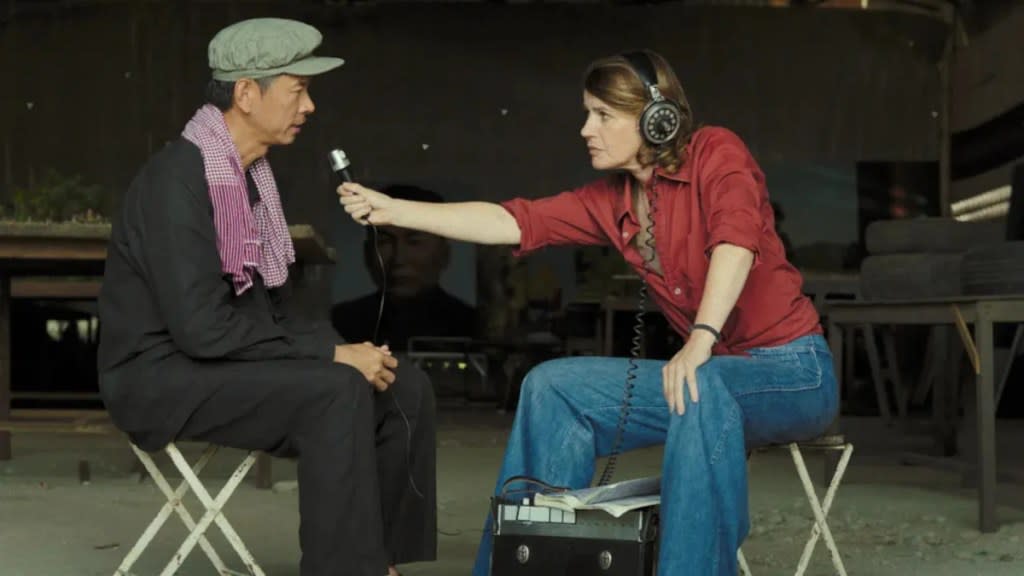‘Meeting With Pol Pot’ Is a Lesson in Genocide

The timing could not be more spot on for “Meeting With Pol Pot,” Cambodian filmmaker Rithy Panh’s quiet, powerful drama about three French journalists who visit the war-torn country and discover the horrors being perpetrated by Pol Pot under the dogma of revolutionary change. The film is playing in Cannes’ premiere section and debuted on Thursday night.
Of course, it’s never the wrong time to be reminded of the origins of genocide, and the fear and silence that it can impose on those hoping to survive it. But as the world feels engulfed anew by a wave of uncompromising protest around post-colonial and anti-imperial demands, it’s a great time to revisit the story of a left-wing regime that in its savage pursuit to supposedly create a just and equitable society, instead murdered a quarter of its people.
Yes, one in every four Cambodians was murdered under the revolutionary horrors of the Khmer Rouge in the late 1970s, led by their Sorbonne-educated leader whose willingness to wipe out his own people remains a chilling reminder of extremism in place of humanity.
The film is based on the seminal account of Cambodia under the Khmer by then-foreign correspondent Elizabeth Becker, “When the War Is Over.” The book is more than 40 years old, but remains a classic of courageous foreign reporting, and a testament to the necessity of spending time on the ground to learn the truth.
In this fictionalized account, Irene Jacob plays the central role of the journalist, Lise Delbo who is based on Becker, accompanied by the ideologically driven intellectual Alain Cariou, a classmate of Pol Pot (played by Gregoire Colin) and photographer Paul (Cyril Guei).
Spending time on the ground – even when invited by the Khmer to counter Western propaganda about Cambodia – is dangerous. The three are immediately subjected to Potemkin village situations, scripted interviews, and quickly suspect they are not seeing the truth.
But when they start to ask tougher questions – where have all the Cambodian intellectuals gone, they ask? – the Khmer don’t hesitate to sharpen their edges. Paul ventures away from the minders and finds a killing field and starving families, to his own ill effect. Panh uses clay figures to movingly represent some of the worst human suffering, and to bring a different dimensionality to his characters.
The journalists are virtually held hostage and monitored constantly. Eventually Cariou and Delbo are taken to interview the notorious Pol Pot, and Carious finally allows his philosophical defenses to crumble. They ask what happens to individuals when society must be deconstructed and rebuilt? What happens to families, communities, churches, individuals’ ambition and identity?
In response, Pol Pot insists that erasing the malign effects of Western imperialism and remaking a society requires harsh measures.
“We must struggle for counterrevolution,” he says, vaguely.
Cariou asks the obvious, as millions of lives hang in the balance of this reference to this “struggle.” “What is counterrevolution?” he asks. Pol Pot does not reply.
Director Panh has made many films about Cambodia’s painful past, including “A Cambodian Tragedy” in 1996. But in the movie’s press notes, he says he was compelled to make this film now as foreign reporting has slid into decline, and radical ideologies are on the rise.
“Although it focuses on the Khmer Rouge past, the film also evokes the current state of radical ideologies that exclude, lock and refuse to confront ideas,” he said. “It evokes the resurgence of utopias that claim to think and act for the good of all, but which slide into a quest for purity, a quest that leads humanist revolution astray.”
He added: “It denounces this edifice of thought pushed to the point of absurdity, whose effects on human beings are frightening.”
The film received a standing ovation in the Debussy hall, including not just for the director and cast, but a deeply moved Elizabeth Becker herself.
The post ‘Meeting With Pol Pot’ Is a Lesson in Genocide appeared first on TheWrap.


